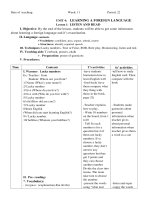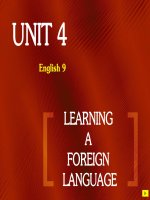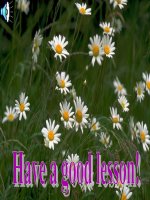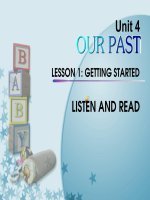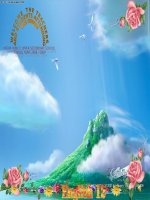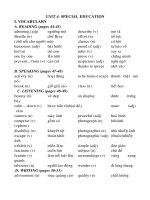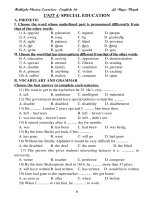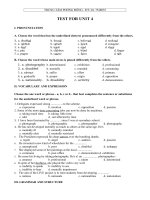E10 UNIT 4 TEST 1
Bạn đang xem bản rút gọn của tài liệu. Xem và tải ngay bản đầy đủ của tài liệu tại đây (116.34 KB, 5 trang )
Trung t©m ph¬ng ®«ng - §T: 04. 7548035
TEST FOR UNIT 4
I. PRONUNCIATION
A. Choose the word that has the underlined (letters) pronounced differently from the others.
1. a. disabled b. forced c. believed d. realized
2. a. rubbish b. suburb c. lunch d. consume
3. a. deaf b. teach c. read d. sleep
4: a. pity b. children c. blind d. finger
5. a. proper b. course c. force d. talk
B. Choose the word whose main stress is placed differently from the others.
1. a. photography b. determinated c. exhibition d. professional
2. a. disabled b. mentally c. retarded d. consuming
3. a. subtract b. suffer c. effort d. primary
4. a. gradually b. proper c. origin d. opposition
5. a. nationality. b. disability c. activity d. demonstration.
IL VOCABULARY AND EXPRESSION
Choose the one word or phrase - a, b, c or d - that best completes the sentence or substitutes for
the underlined word or phrase.
1. Delegates expressed strong ................to the scheme.
a. expression b. emotion c. opposition d. passion
2. Some of the more time concerning jobs can now be done by machines.
a. taking much time b. taking
.
little time
c. odd d. .not affected by time
3. I have been fascinated by .............. since I was at secondary school.
a. photograph b. photographic c. photographer d. photography
4. He has not developed mentally as much as others at the same age. He's
a. mentally ill b. mentally retarded
c. mentally alert d. mentally restricted
5. The President expressed his deep sorrow over the bombing deaths.
a. regret b. anger c. sadness d. passion
6. He invented a new kind of wheelchair for the ................
a. unemployed b. poor c. disabled d. unhappy
7. She displayed some of her paintings at the local ...................
a. commune b. post office c. demonstration d. exhibition
5. He earns his living by taking photographs. He's a! an ................... photographer.-
a. amateur b. professional c. talent d. determined
6. In spite of her deafness, she played the violin very well.
a. inability to speak b. inability to see
c. inability to hear d. mentally impairment
8. The aim of the LIVE project is to train students from developing ...............
a. nations b. nationals c. nationalities d. nationalism
III. GRAMMAR AND STRUCTURE
Trung t©m ph¬ng ®«ng - §T: 04. 7548035
A. Choose the one word or phrase - b, c, or d - that best completes the sentence.
1. ................ he was not a musician himself, Lawrence Hammond developed an electronic keyboard
instrument called the Hammond organ.
a. Although b. That c. Despite d. For
2. ................ the storm. I would have been home before eight.
a. Instead of b. But for c. During d. Because of
3. The
g
overnment is doing nothing to help.......................
a. the poor people b. the poor ones c. the poor d. the pours
4. It rained all the time, ................. was a
great pity.
a. that b. what c. which d. who
5. .....................you really need is a long holiday.
a. That b. What c. Which d. Who
5. I.................like going to pop concerts when I was a teenager.
a. would b. used to c. must d. could
7. Rick left the party early because he .............. a headache
a. had b. has c. used to have d. was having
8. Claude didn't ............... in Canada.
a. lived b. use to live c. used to live d. used to living
9. I remember you. You ........... to school here.
a. were used to going b. have already gone c. went d. used to go
10. One day last March, I .............. a very strange letter.
a. get b. got c. used to get d. was getting
11. Can you show me .............. the film in this camera?
a. how to change b. how change
c. how changing d. how you changed
12. I didn't like the noise in the city at first. But now................. here..
a. I got used to living b. I'm used to living c. used to live d. I used to living
13. Galileo ...............his first telescope in 1609.
a. builds b. built c. has built d. had built
14. Last summer, we had ...............holiday in Spain.
a. a two week's b. a two-weeks c. two-week d. a two-week
15. 15. ....................... at the party, we saw Ruth standing. alone.
16. a. Arrived b. We arrived c. Arriving. d. We were arriving
B. Identify the one underlined word or phrase - A. B. C or D - that must be changed for the
sentence to be correct.
1. When I was a child, summers would be warmer and winters colder than now.
A B C D
2. What do you use to do when you felt afraid?
A B C D
3. I've been studying French since I've high school.
A B C D
4. You have to buckle your seat belt now or you couldn
’
t drive. It's the law.
A B C D
5. She's always anno
y
in
g
about something.
A B C D
6. I can't find my diary, that is a real nuisance.
A B C D
7. None of the young in the village can find job
A B C D
8. It took them at least two months learnin
g
how to pronounce these words.
Trung t©m ph¬ng ®«ng - §T: 04. 7548035
A B C D
9. Helen Keller, who was both blind and deafness, overcame her inabilities with
A B C D
he help of her teacher. Ann Sullivan.
10. Lake Superior, that lies on the US Canadian border. is the largest lake in North America.
A B C D
IV. SPEAKING
Choose the sentence or phrase that best completes the dialogue.
A: (1)_____________________________________________________________
B: Oh, my weekend was, terrific. thanks.
A: (2) ____________________________________________________________
B: On Saturday, I participated in the local charity society to visit Nguyen Dinh Chieu Special School
for the Blind.
A: (3) ________________________________________________________________
B: Well, they were having a music lesson.
A: Really? (4) _________________________________________________________They listened
and used their fingers to touch the music notes in Braille and sang.
A: Great! Next time (5) _________________________________________________
1. a. What did you do on weekend? b. How was your weekend?
c. Did you have a good weekend? d. How did you spend your weekend?
2. a. What do you do? b. Where did you go on Saturday?
c. What did you do on Saturday? d. What were you doing on Saturday?
3. a. What were the visually impaired students doing when you came?
b. What did the visually impaired students do when you came?
c. What were the visually impaired students doing before you came?
d. What did the visually impaired students do after you had come?
4. a. How they can learn music without seeing?
b. How can they learn music if they not see?
c. What do they do to learn music?
d. How can they learn music without seine
5. a. I'll go. b. I'd like to visit, too.
c. call me if you have such an activity. d. me if you go.
V. READING COMPREHENSION
A. Choose the one option - a, b, c or d - that best fits each of the num bared blank.
Louis Braille was born in 1309 (1)...................Coup ray. He was a French (2) ..................of the blind.
He (3).............. was blind from Me age of three, and in 1818 he went to the National Institute
(4).................. the Young Blind in Paris. Soon showing marked (5)......................... in both science and
music, he became famous in Paris (6)................... an organist and violoncellist. In 1826 Braille began
teaching the blind in the (7................ . Braille is known for his idea of (8).................. the Briberies. Point
writing (9)...................... of embossed dots and dashes on cardboard;. the Braille system (10)....................
from it is used successfully today, in slightly modified form, and in many countries.
1. a. on b. at c. in d. of
2. a. designer b. doctor c. teacher d. lawyer
3. a. who b. whom c. himself d. for himself
4. a. for b. of c. to d. with
5. a. activity b. ability c. intelligence d. determination
6. a. like b. as c. such as d. for
Trung t©m ph¬ng ®«ng - §T: 04. 7548035
7 a. academy b. organization c. school d. institute
8. a. expressing b. learning c. bringing d. modifying
9. a. contains b. combines c. consists d. comprises
10. a. made b. taken c. done d. derived
B. Read the passage, then choose the correct answer - a. b, c, or d.
The first school for blind, deaf and mute children in the Tibet Autonomous Region celebrated its
first anniversary on Friday. The school is built in the eastern suburb of Lhasa, capital of Tibet, and is
designed to hold 200 students covers 20,000 square meters.
The school curriculum includes Braille and sign language- training, Tibetan, mathematics,
writing, ethics training, physical education. arts, handicrafts, speech and walking courses. At the
celebration, the audience was touched by, a silent song expressed by the students with sign language.
Baiba Toinzhub, a 10-year-old blind child, can speak fluent Chinese and is 71 at singing and dancing.
He told the visitors that life in the boarding school? comfortable.
1 What type of students attend the school?
a. Children who live in the Tibet Autonomous Region
b. Children with a variety of disabilities.
c. Children who cannot see, hear, or speak.
d. Children who are visually impaired.
2. The school is located in...................................
a. the capital of Tibet
b. the suburb of the capital of Tibet
c. the eastern of Tibet
d. 20,000 square meters
3. The school is......................................
a. able to hold 200 students b. the first boarding school
c. 20.000 square meters in area d. a and c are correct
4. Which subject is taught in the school?
a. Physics b. Foreign languages c. Computers d. Braille
5. Which of the following is not true?
a. Tibet's first deaf-mute school celebrated its first birthday.
b. The visitors were welcomed with a beautiful song.
c. Life in the boarding school is comfortable.
d. Baiba Toinzhub can sing and dance very well.
VI. WRITING
Choose the sentence (a, b, c, or d) which is closest in meaning to the sentence printed before.
1. When did you last ride a bike?
a. How often did you ride a bike?
b. How long is it since you rode a bike?
c. What time is it since you ride a bike?
d. How much time did you ride a bike?
2. The train was due to leave five minutes ago.
a. The train was supposed to leave five minutes ago.
b. The train is five minutes late in leaving.
c. The train left five minutes ago.
d. a and b are correct
3. I didn't use to like football.
a. I don't like football.
b. When I was young I liked football, but now I don't.
c. Once I didn't like football, but now I do.
Trung t©m ph¬ng ®«ng - §T: 04. 7548035
d. I wasn't accustomed to football.
4. The police blocked off the road, which caused a traffic jam.
a. The road that caused a traffic jam was blocked off by the police.
b. The police blocked off a traffic jam on the road.
c. The police blocked off the road because it caused a traffic jam.
d. The fact that the police blocked off the road caused a traffic jam.
5. Henry should have done his homework last night. but he watched TV instead.
a. Henry didn't watch TV last night because he had to do his homework.
b. Henry watched TV last night instead of doing his homework.
c. Henry did his homework while watching TV.
d. Henry had already done his homework before he watched TV.
